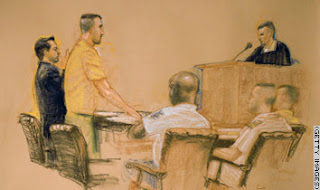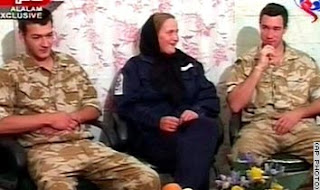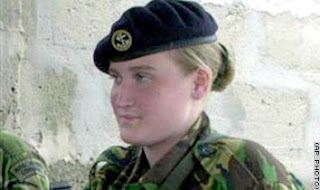
CAMP DAVID, Maryland (CNN) -- President Bush on Saturday called Iran's detention of 15 British sailors and marines "inexcusable behavior" and called for their release, referring to them as "hostages."
"The Iranians took these people out of Iraqi water," said Bush, speaking at Camp David with Brazilian President Luiz Inacio Lula da Silva. "And it's inexcusable behavior."
The 15 have been detained in an undisclosed location in Iran since March 23. Iran claims they "trespassed" into Iranian territorial waters. Britain denies the claim.
The U.S. government had been notably quiet on the subject from the beginning, but Bush voiced strong opinions Saturday.
"The Iranians must give back the hostages," he said. "They were innocent. They were doing nothing wrong. And they were summarily plucked out of water."
Lula da Silva did not address the British issue, but said Brazil has no political issues with Iran and considers Tehran an important trading partner.
Also Saturday, an Iranian official said his country had started a legal process to determine the guilt or innocence of the detainees.
If they are not guilty, they will be freed, said Ambassador Gholam-Reza Ansari, who is in Russia.
"But the legal process is going on and has to be completed, and if they are found guilty, they will face the punishment," he said on Russian TV. (Watch Iranian ambassador call British sailors 'invaders' )
Ansari -- speaking to the TV news channel Vesti-24 -- also hinted that there could be a diplomatic settlement, according to the Islamic Republic News Agency in Iran.
"If the UK government admits its mistake and apologizes to Iran for its naval personnel's trespassing of Iranian territorial waters, the issue can be easily settled."
Iran's president called Britain "arrogant" Saturday for not apologizing, media in Iran reported.
President Mahmoud Ahmadinejad -- in remarks carried by state radio and reported by the state-run Islamic Republic News Agency -- said, "The occupying British forces entered our waters, and our border guards, with courage and alertness, arrested them."
Instead of issuing any regret or displaying any shame, Britain postured, he said, issuing declarations and making speeches.
"These arrogants, due to their arrogant mentality and selfishness, instead of apologizing, they acted as if we owe them," he said.
Ahmadinejad also took a wider swipe at Britain and other Western nations.
"In the last 300 years, the arrogant powers have been stealing from other nations. They have enslaved the people of other nations," he said.
He said that after World War II, the Western countries "declared themselves the winners and created international organizations in order to continue their domination over the rest of the world."
"The arrogant powers unfortunately today are openly breaking the laws that those international organizations they themselves founded and created," Ahmadinejad said, according to IRNA.
British Foreign Secretary Margaret Beckett said Saturday that Britain has written to Iran to seek a peaceful resolution to the standoff.
"We have made our response, and now we are beginning to discuss. As you may know, it's a holiday period in Iran, and that is perhaps not too helpful," said Beckett, speaking to reporters at the European Union foreign ministers' meeting in Germany.
The contents of the diplomatic notes passed between the two countries have not been disclosed.
"The message I want to send is that everyone regrets that this position has arisen. What we want is a way out of it, we want it peacefully, and we want it as soon as possible. We would like to be told where our personnel are; we would like to be given access to them," Beckett said.
The 15 British sailors and marines have been detained in an undisclosed location in Iran since March 23. (Watch brother and friends tell of fears for sailor )
EU officials meeting in Germany -- already dealing with the conflict over Iran's nuclear aspirations -- said they wanted to resolve the crisis.
"Of course, we're standing shoulder-to-shoulder with the United Kingdom," German Foreign Minister Frank-Walter Steinmeier told reporters.
Steinmeier said ministers had given EU security and foreign affairs chief Javier Solana a brief to use his office to help secure the release of the sailors.
Third letter released
On Friday, Iran released a third letter purportedly written by detained British sailor Faye Turney, in which she claimed to have been "sacrificed" by British and U.S. policies and urged both countries to withdraw their troops from Iraq. (Full story)
The letter, the authenticity of which CNN cannot independently determine, followed two previous letters said to be written by Turney and released separately this week. (Watch Turney say what happened when she was captured )
Friday's letter was released just hours after Turney appeared with two other Britons in new video aired by Arabic language network Al Alam. (Text of letters)
In the video, one of the 15 detained service personnel held in Iran confessed to "entering your waters without permission."
"On the 23rd of March 2007 in Iranian waters we trespassed without permission," said Nathan Thomas Summers. The third detainee in the video has not been identified. (Watch detained British sailor make his 'confession' )
Summers said the Britons were being treated well, as did the Turney letter.
"The Iranians took these people out of Iraqi water," said Bush, speaking at Camp David with Brazilian President Luiz Inacio Lula da Silva. "And it's inexcusable behavior."
The 15 have been detained in an undisclosed location in Iran since March 23. Iran claims they "trespassed" into Iranian territorial waters. Britain denies the claim.
The U.S. government had been notably quiet on the subject from the beginning, but Bush voiced strong opinions Saturday.
"The Iranians must give back the hostages," he said. "They were innocent. They were doing nothing wrong. And they were summarily plucked out of water."
Lula da Silva did not address the British issue, but said Brazil has no political issues with Iran and considers Tehran an important trading partner.
Also Saturday, an Iranian official said his country had started a legal process to determine the guilt or innocence of the detainees.
If they are not guilty, they will be freed, said Ambassador Gholam-Reza Ansari, who is in Russia.
"But the legal process is going on and has to be completed, and if they are found guilty, they will face the punishment," he said on Russian TV. (Watch Iranian ambassador call British sailors 'invaders' )
Ansari -- speaking to the TV news channel Vesti-24 -- also hinted that there could be a diplomatic settlement, according to the Islamic Republic News Agency in Iran.
"If the UK government admits its mistake and apologizes to Iran for its naval personnel's trespassing of Iranian territorial waters, the issue can be easily settled."
Iran's president called Britain "arrogant" Saturday for not apologizing, media in Iran reported.
President Mahmoud Ahmadinejad -- in remarks carried by state radio and reported by the state-run Islamic Republic News Agency -- said, "The occupying British forces entered our waters, and our border guards, with courage and alertness, arrested them."
Instead of issuing any regret or displaying any shame, Britain postured, he said, issuing declarations and making speeches.
"These arrogants, due to their arrogant mentality and selfishness, instead of apologizing, they acted as if we owe them," he said.
Ahmadinejad also took a wider swipe at Britain and other Western nations.
"In the last 300 years, the arrogant powers have been stealing from other nations. They have enslaved the people of other nations," he said.
He said that after World War II, the Western countries "declared themselves the winners and created international organizations in order to continue their domination over the rest of the world."
"The arrogant powers unfortunately today are openly breaking the laws that those international organizations they themselves founded and created," Ahmadinejad said, according to IRNA.
British Foreign Secretary Margaret Beckett said Saturday that Britain has written to Iran to seek a peaceful resolution to the standoff.
"We have made our response, and now we are beginning to discuss. As you may know, it's a holiday period in Iran, and that is perhaps not too helpful," said Beckett, speaking to reporters at the European Union foreign ministers' meeting in Germany.
The contents of the diplomatic notes passed between the two countries have not been disclosed.
"The message I want to send is that everyone regrets that this position has arisen. What we want is a way out of it, we want it peacefully, and we want it as soon as possible. We would like to be told where our personnel are; we would like to be given access to them," Beckett said.
The 15 British sailors and marines have been detained in an undisclosed location in Iran since March 23. (Watch brother and friends tell of fears for sailor )
EU officials meeting in Germany -- already dealing with the conflict over Iran's nuclear aspirations -- said they wanted to resolve the crisis.
"Of course, we're standing shoulder-to-shoulder with the United Kingdom," German Foreign Minister Frank-Walter Steinmeier told reporters.
Steinmeier said ministers had given EU security and foreign affairs chief Javier Solana a brief to use his office to help secure the release of the sailors.
Third letter released
On Friday, Iran released a third letter purportedly written by detained British sailor Faye Turney, in which she claimed to have been "sacrificed" by British and U.S. policies and urged both countries to withdraw their troops from Iraq. (Full story)
The letter, the authenticity of which CNN cannot independently determine, followed two previous letters said to be written by Turney and released separately this week. (Watch Turney say what happened when she was captured )
Friday's letter was released just hours after Turney appeared with two other Britons in new video aired by Arabic language network Al Alam. (Text of letters)
In the video, one of the 15 detained service personnel held in Iran confessed to "entering your waters without permission."
"On the 23rd of March 2007 in Iranian waters we trespassed without permission," said Nathan Thomas Summers. The third detainee in the video has not been identified. (Watch detained British sailor make his 'confession' )
Summers said the Britons were being treated well, as did the Turney letter.

















